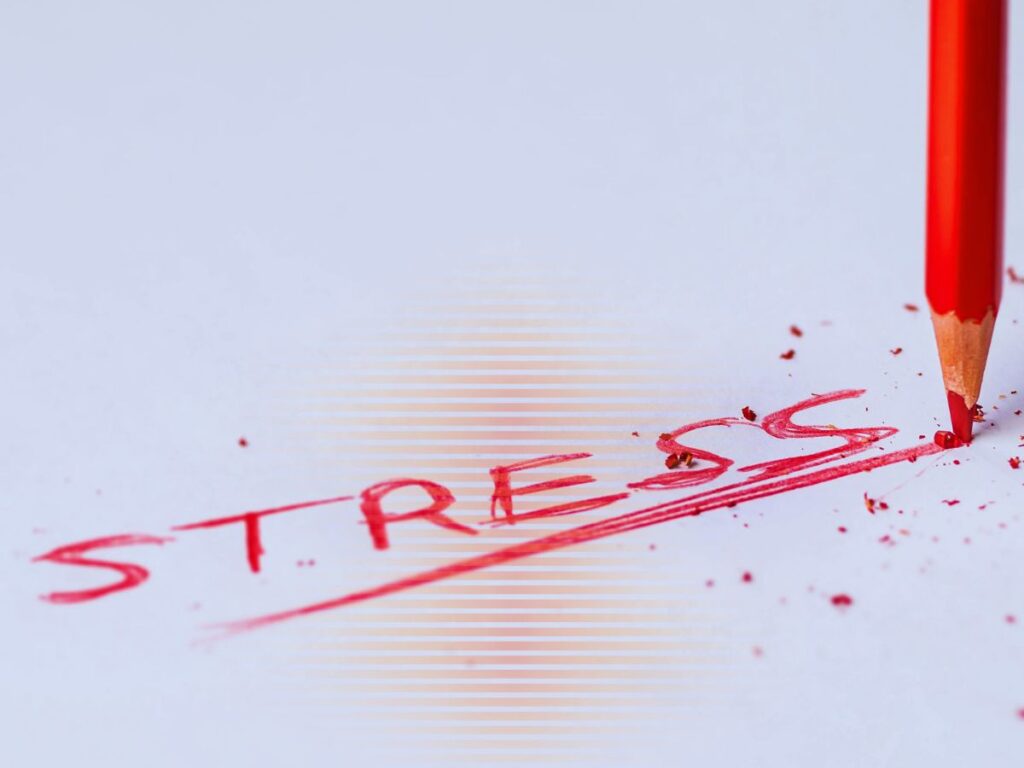Introduction
How can stress cause an eating disorder? A high-speed lifestyle is a typical phenomenon of developing an eating disorder due to stress in our age in which the majority of people of all ages suffer from stress. However, the chronic stress is not the only adverse impact. Eating disorders can also be the outcome. consequently, in this extended examination, we explore the intimate link between stress and eating disorders including definitions, causes, manifestations, and how it works as a trigger for unhealthy eating patterns.

Concept of Eating Disorders
Eating disorder describes mental health problems grouped as they involve variations in individuals’ usual eating habits and ability to distinguish or differentiate between their weight and shape from the normal standard. The illnesses that include anorexia nervosa, bulimia nervosa, and binge eating disorder, originating from a combination of hereditary, environmental, and psychological factors are the most common. People developing an eating disorder due to stress can sometimes be prone to extremism, like severe calorie restriction, binge eating, purging techniques, and excessive body massage with the main aim of controlling their weight and getting rid of emotional burdens.
What is Stress?
Stress is a universal human physiological reaction to threats or demands that activate the “natural” activity of “fight or flight”. Sometimes acute stress can be adaptable, if only in challenging situations, but chronic stress can cause numerous somatic and psychological problems if this stress is increased for long periods. Everyday sources of stress may be related to work overload, academic burden, monetary worst, relationship issues, and traumatic incidents.

The Link between Stress and Eating Disorders
Can you develop an eating disorder from stress? Stress is the very cause that brings about eating disorders and is also a product of these behaviors. Developing an eating disorder due to stress occurs when the body responds to excessive demands perceived or real. The link between eating disorders and stress constitutes the initial stage of what is referred to as the fight-or-flight reaction by our body which we use to deal with adversities. As opposed to acute stress, which can be positive, chronic or excessive stress, the other hand, can adversely affect our physical and mental well-being, with eating disorders being just one of its potential consequences.
Stress Hormone
Among the activities taking place in the body when stressed is the release of a hormone which can be named the “stress hormone” or called cortisol. This cortisol can disrupt appetite regulation, so eating behaviors are changed. For some stress is a calorie-burning function, and people who have it become thin as doing so is characteristic of the anorexia nervosa case. Same as that, some can eat more to get rid of stress. They end up in binge eating or episodes of emotional eating that can lead to problems like bulimia nervosa.
Can stress cause eating disorders? Stress magnifies underlying psychological predilections which could come in the form of anxiety, low self-esteem, and depression which are usually effects of eating disorders. When developing an eating disorder due to stress People begin to manipulate food for the same purpose as a mechanism to pleading or getting rid of their emotional bond, which is the strong causal relationship between stress and disordered eating behavior.
Symptoms of Developing an Eating Disorder Due To Stress
Being aware of stress signs (that may be associated with the disorder) and eating disorder symptoms is important for intervention and treatment in the early stages and at a better level. Determination of eating disorder symptoms is of paramount importance for early interventions and treatment. While symptoms may vary depending on the type of developing an eating disorder due to stress, common signs include;
Extreme Weight Changes
Shedding pounds or gaining without a medical reason rapidly.Constant concerns of inadequacy of body size regardless of facts. Taking food for granted, fixating on calories, dieting, or thinking about meals.
Eating in Secret
Developing an eating disorder due to stress also results in withdrawing from social interactions, hoarding food, eating on their own, or engaging in secretive eating habits.
Emotional Symptoms
Severe mood swings, irritability, anxiety, depression, obsessive feelings of sadness or shame, and a constant focus on food, weight, or body image.

Behavioral Patterns
The complexities of the disease include food restriction, detrimental eating patterns, and purging behaviors like vomiting on self, using laxatives, excessive exercising, social isolation, and suffering from any food-related situation.
Binge Eating or Purging
Engaging in a large amount of food within a short time (binge eating) or frequent practices of purging such as self-induced vomiting, abuse of laxatives, or excessive exercise (bulimia nervosa) is one of the symptoms of developing an eating disorder due to stress like binge eating.
Binge eating disorder regularly manifests itself with a high caloric food intake in a short time that comes with feelings of guilt and loss of control. People affected by bulimia nervosa usually resort to purging behaviors (like self-induced vomiting or misuse of laxatives) to get the balance back whenever they overeat.
Social Withdrawal
Refraining from social events related to food, staying alone, and stop doing things we enjoy. People with eating disorders tend to stop socializing with people at activities associated with food by developing an eating disorder due to stress, showing secretive behavior around meals, or even withdrawing from any situation in which others can control their eating habits.
Physical Symptoms
Causing changes in weight, alterations in energy levels, disruption of the digestive system, distraction of sleep, and hormonal imbalances. Fatigueness, dizziness, fainting, gastrointestinal issues, menstrual disruption, and dental problems.
Restrictive Eating Patterns
People with anorexia nervosa may often severely limit their food meeting and this will cause significant weight loss and nutritional deficiencies by developing an eating disorder due to stress.
Obsession with Weight and Body Image
The constant thinking about weight, body shape, and the look of an individual with eating disorders is what makes them have low self-esteem and body dissatisfaction. Eating disorders and stress intensify negative body image perceptions, especially in societies where thinness is given much value, coupled with equating self-worth with appearance. The higher the stress level the more likely one is going to feel inadequate, and might try maladaptive methods to reach the illusionary ideal.
Perfectionism and Control
The combination of stressful surroundings and external pressure, as well as indulging in perfectionistic behaviors, may lead to a need for control over one’s body and choice of food. Individuals may establish rigid dietary habits and rites as tools to fight disorder chaos and confusion by developing an eating disorder due to stress.
Coping Mechanism
Plenty of people resort to food as a personal therapy through which to relieve stress and regulate their emotions. Eating episodes in response to stressful situations could turn into an emotional eating circle: guilt, shame, and food serving as a comforting source.
Biological Responses
Chronic stress can disrupt the levels of hormones that have an impact on your appetite, such as cortisol and ghrelin, which can lead to changes in your hunger cues and food cravings by developing an eating disorder due to stress. These hormone swings can lead to binge eating disorder or even other types of disordered eating.
Strategies for Prevention and Management
Stress management comes in handy to prevent eating disorders or work to aggravate them. Here are some evidence-based coping strategies;
Seek Professional Support
Work alongside professionals such as a psychotherapist, psychologist, and RD who have received specific education and expertise in eating disorders to ensure proper treatment and assistance are given to those developing an eating disorder due to stress.

Practice Stress Reduction Techniques
Use relaxation techniques like deep breathing, mindfulness meditation, or progressive muscle relaxation in your daily life routine and you will become then more relaxed and less stressed.
Trauma and Coping Strategies
People who were affected by trauma or had negative childhood experiences usually have bad coping strategies like disordered eating which are adopted to reduce stressful feelings.
Prioritize Self-Care
Treat yourself well by getting enough sleep, eating a balanced diet, regular body workouts, and leisure activities that enhance your mood.
Build a Support Network
Keep positive people around who will understand, be supportive provide empathy, and help you with the practical matters on your path to recovery from developing an eating disorder due to stress.
Challenge Negative Thought Patterns
Apply the cognitive-behavioral procedures to evaluate the food and body as well as stress-related negative thought patterns and beliefs substituting them for the adaptive and empowering perspective.
Stress Management Techniques
Avoiding the beginning of the eating disorders built by stress is a multifaceted mission in which both individual and system aspects should be considered. Promote the involvement of stress management skills like mindfulness meditation, deep breath exercises, progress muscle relaxation, and activities that promote fun and enjoyment.
Healthy Coping Mechanisms
Educate the people on effective coping skills to deal with stress, including seeking social support, expressing emotions through creative outlets, setting realistic goals, and practicing self-compassion. Participate in activities that help you maintain a good psychological balance and find alternative ways to release stress, like hobbies, physical workouts, writing, or spending time with your friends, and prevent developing an eating disorder due to stress.
Promote Body Positivity
Overtake the social norms and portray body diversity and acceptance to eradicate the increasing concern about sticking to absurd beauty standards. Make people realize the importance of a healthy and loving relationship with their bodies and the need to adopt lifestyle practices that nourish their minds and bodies.
Early Intervention and Support
Offer mental health assistance, which is accessible and based on culture, including therapy, support groups, and nutrition counseling, for people who have stress-related eating concerns. Foster open communication and fight the misconception of seeking help regarding mental health issues.
If you want to learn more, Click here.
Conclusion
Developing an eating disorder due to stress explains that a connection between stress and eating disorders is fairly convoluted and multi-faceted, so much so that stress can be a key contributing factor in the genesis as well as the maintenance of problematic eating behaviors. By realizing that stress has in direct relationship with eating disorders and mental health, we can establish compassionate habitats and apply well-grounded action plans.
With education on how to manage stress, improving awareness, and sympathetic assistance, we can help individuals overcome the drawbacks that are linked to stress and develop a healthy outlook on life, food, body, and self. Realize that raising a hand when you feel overwhelmed is an expression of strength and healing is doable when you have the right caring and treatment around.

